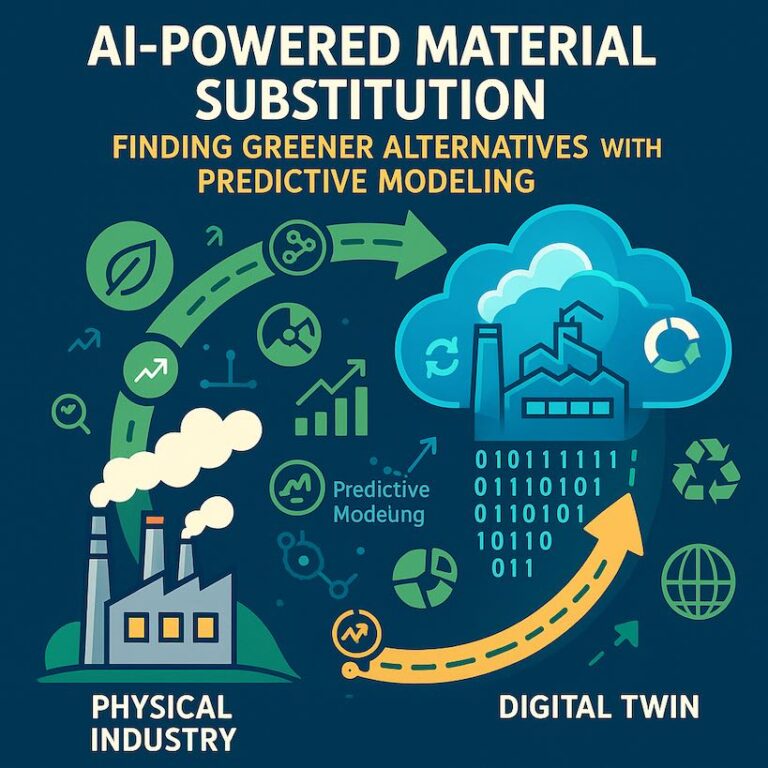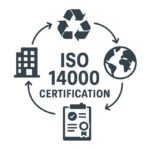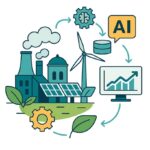
Section 1: Introduction – The Dawn of Sustainable Digital Transformation
In today’s world, sustainability is no longer a corporate buzzword—it’s a business imperative. Organizations across manufacturing, infrastructure, and logistics are facing mounting pressure from regulators, stakeholders, and consumers to reduce their environmental impact. From climate change to resource depletion, the challenges are urgent and far-reaching.
Enter digital twins: once the realm of engineering and aerospace, this powerful technology has found new purpose in the race toward sustainability. A digital twin is a virtual replica of a physical system—be it a factory floor, a supply chain, or an entire city. But this is no static model. It’s a dynamic, data-driven simulation that mirrors real-world conditions in real time.
What if your organization could simulate the environmental impact of a product before it’s manufactured? What if you could predict how a material swap would affect emissions, resource consumption, and end-of-life recyclability? That’s the transformative power of digital twins when applied to sustainability.
This blog post explores how AI-powered digital twins are revolutionizing the way companies approach environmental challenges—particularly in the area of material substitution for sustainability. By fusing lifecycle data, predictive analytics, and smart modeling, companies can now discover greener alternatives and make decisions with real-time insight, not just hindsight.
Let’s dive into how this cutting-edge technology—supported by DEISO’s environmental expertise and digital innovation—enables smarter, greener choices that drive real impact.

Section 2: What Exactly is a Digital Twin in the Context of Sustainability?
At its core, a digital twin is a real-time virtual model of a physical object, system, or process. But unlike static 3D models or simple simulations, a digital twin is dynamic—it continuously integrates data from sensors, systems, and operations to reflect the actual, evolving state of its real-world counterpart.
In the context of sustainability, a digital twin goes far beyond engineering performance. It becomes a “living environmental model”—capable of tracking, analyzing, and forecasting the ecological impact of decisions in real-time.
Here’s how it works:
Modeling Physical Assets: A digital twin might represent a production line, a logistics chain, or even an entire building. These models are rich with detail—from material use and energy flows to maintenance schedules and spatial layouts.
Environmental Data Integration: What makes a digital twin sustainable is the integration of environmental data—think carbon emissions, electricity consumption, water use, waste generation, and more. By embedding environmental intelligence into the model, companies can understand the true ecological cost of their operations.
Simulating Greener Outcomes: With all of this data in one place, businesses can simulate how material changes, process tweaks, or sourcing shifts could affect their environmental footprint—before implementing them in the real world. This makes the digital twin a critical decision-making engine for sustainability.
The result is a powerful convergence of engineering intelligence and environmental responsibility. With DEISO’s expertise in LCA (Life Cycle Assessment), sustainability analytics, and digital platform development, digital twins become not just a tool—but a transformative strategy for sustainable innovation.

Section 3: Beyond Compliance – Why Digital Twins are the Future of ESG and Impact Reduction
Many organizations today approach sustainability reactively—conducting environmental assessments after the fact, reporting on emissions once a year, and implementing incremental changes only when required by regulation. While this approach might satisfy basic compliance, it often misses opportunities for deeper impact, innovation, and cost savings.
Digital twins flip this paradigm. By continuously collecting, analyzing, and simulating data in real time, digital twins empower companies to shift from compliance-driven to performance-driven sustainability.
Here’s how:
✅ 1. Real-Time Monitoring and Analytics
Instead of waiting months for sustainability reports, digital twins provide continuous insight. You can monitor:
Energy usage across machines and buildings.
CO₂ emissions by the minute.
Waste streams from production.
This turns invisible environmental costs into visible, measurable metrics.
✅ 2. Predictive Modeling for Sustainable Choices
Digital twins use AI to simulate future scenarios:
What happens if a material is substituted with a recycled or bio-based option?
How will changing a supplier affect the carbon footprint of a product?
These insights help businesses predict environmental consequences before changes are made, leading to smarter, greener decisions.
✅ 3. Scenario Planning for Optimization
With a digital twin, companies can ask:
“What if we reroute logistics to reduce fuel consumption?”
“What if we shift production times to off-peak energy hours?”
This capability enables what-if analysis that guides environmental optimization—without trial-and-error in the real world.
✅ 4. Proactive Environmental Management
The most transformative aspect of digital twins? They enable businesses to act before problems escalate. Instead of reacting to a spike in energy use or a failed ESG audit, companies can adjust operations in real time.
This proactive mindset aligns perfectly with modern ESG expectations—where investors, customers, and regulators all demand transparency, traceability, and continuous improvement.
🧠 DEISO Insight:
DEISO’s consultancy and digital services are built to empower this very transition. By integrating real-time LCA and carbon accounting into your digital twin strategy, we help you go beyond ESG compliance—toward measurable, real-time impact reduction.

Section 4: Key Applications – Where Digital Twins Make a Real Difference in Sustainability
Digital twins are no longer confined to theoretical use—they are actively reshaping sustainability efforts across industries. By connecting real-time environmental data with AI-powered simulation, businesses gain the ability to manage and reduce their ecological footprint in concrete, measurable ways.
Let’s explore three sectors where digital twins are delivering transformative sustainability results—with DEISO’s expert support at every step:
🏭 Manufacturing
Production Line Optimization: Adjust energy-intensive operations based on real-time energy prices or renewable availability.
Real-Time Life Cycle Assessment (LCA): Combine DEISO’s LCA modeling with digital twins to instantly assess the footprint of production changes.
Emissions Tracking: Monitor Scope 1 (direct), Scope 2 (energy), and Scope 3 (supply chain) emissions dynamically, not just annually.
💡 DEISO Insight: Our team enables manufacturers to integrate LCA software with digital twins for continuous, automated impact assessments.
🏙️ Infrastructure & Smart Cities
Energy Management: Simulate and control energy usage in real-time across smart buildings, campuses, and municipal grids.
Waste System Optimization: Monitor and adjust recycling, composting, and waste flows dynamically.
Environmental Quality Monitoring: Continuously analyze air, water, and noise pollution through integrated sensor data.
💡 DEISO Insight: We assist public and private infrastructure projects with AI-driven digital twin solutions for sustainable urban management.
🚚 Logistics & Supply Chain
Fuel Optimization: Model and optimize routes for lowest emissions, not just shortest time.
Carbon Footprint Tracking: Monitor carbon intensity across supply chains—from raw materials to last-mile delivery.
Sourcing Strategy Simulation: Run what-if simulations on alternative suppliers or transport modes to reduce environmental impact.
💡 DEISO Insight: Our predictive analytics tools integrate directly with logistics platforms to support ESG-compliant sourcing and routing strategies.

Section 5: DEISO’s Approach to Empowering Your Sustainable Digital Twin Journey
At DEISO, we don’t just talk about sustainability—we engineer it into the core of your business operations through advanced digital solutions. Our approach to implementing digital twins for environmental sustainability is grounded in data intelligence, domain expertise, and actionable outcomes.
Here’s how we empower innovation-driven companies to unlock real-time environmental impact reduction:
🔍 1. DEISO Consultancy Services
We start by identifying critical environmental impact areas in your organization where digital twin technology can drive measurable results. This includes:
Mapping emissions hotspots
Assessing material usage
Prioritizing sustainability interventions
Our environmental consultants bring deep expertise in Life Cycle Assessment (LCA), ESG frameworks, and circular economy modeling—ensuring every recommendation aligns with your sustainability goals.
💻 2. DEISO Digital & AI Services/Products
Once the strategic foundation is in place, we help you build or integrate custom digital twin platforms that reflect your specific processes, assets, and products. Our capabilities include:
Sensor and IoT integration for real-time data capture
AI-based predictive modeling
Emission factor integration and LCA simulation tools
Carbon accounting and environmental KPIs dashboards
Whether you’re starting from scratch or upgrading an existing system, DEISO tailors the technology to fit your digital maturity and environmental ambitions.
📘 3. DEISO Premium Training
Technology is only as powerful as the people who use it. That’s why DEISO offers premium training for:
Corporate ESG teams
Product R&D departments
Operations and sustainability managers
Our programs cover how to interpret digital twin insights, apply them to real-world decision-making, and track progress toward sustainability KPIs.
🤝 4. DEISO’s Experience and Track Record
We’ve supported companies across manufacturing, logistics, and infrastructure sectors in deploying digital twins for:
Sustainable product design
Supply chain decarbonization
Net-zero strategy execution
What sets DEISO apart is our interdisciplinary expertise—combining environmental science, digital engineering, and business strategy into one cohesive offering.

Section 6: Overcoming Challenges & The Road Ahead
While the promise of digital twins for sustainability is enormous, the path to implementation isn’t without challenges. Organizations must navigate data complexity, integration hurdles, and cultural shifts to fully harness the power of this technology. Fortunately, these challenges are surmountable—with the right strategy and partner.
⚠️ Common Challenges Businesses Face
-
Data Silos & Inconsistencies:
Many organizations have environmental data scattered across spreadsheets, legacy systems, and departments. This fragmentation makes real-time modeling difficult. -
Integration with Physical Systems:
Connecting IoT sensors, machines, and cloud systems requires technical alignment and careful planning. -
Lack of In-House Expertise:
Sustainability teams often lack deep digital modeling knowledge, while digital teams may not understand LCA or ESG frameworks. -
Cost & Time Investment:
Initial development and deployment of digital twins can seem resource-intensive without a clear ROI model.
✅ How DEISO Helps Overcome These Challenges
-
Centralized Environmental Intelligence:
DEISO helps unify all relevant environmental data into a clean, consistent digital framework that powers your digital twin. -
Seamless System Integration:
Our technical teams specialize in connecting data streams from energy meters, ERP systems, and production lines into a cohesive simulation engine. -
Cross-Functional Training & Support:
Through DEISO Premium Training, we bridge the knowledge gap between sustainability and digital teams—ensuring smooth adoption. -
Rapid Prototyping & ROI Modeling:
We deliver phased digital twin rollouts, with early wins and sustainability ROI modeling that build internal confidence and executive buy-in.
🚀 The Road Ahead
As AI, IoT, and cloud infrastructure continue to advance, digital twins will become even more powerful and accessible. Soon, real-time environmental optimization will be the norm—not the exception.
At DEISO, we believe that digital twins are not just tools—they represent a paradigm shift in how organizations operate, make decisions, and lead on sustainability.

Section 7: Conclusion – Your Next Step Towards Real-Time Impact Reduction
The age of reactive sustainability is ending. In its place, forward-thinking companies are embracing real-time, data-driven environmental intelligence—powered by digital twins.
By integrating AI, predictive modeling, and environmental data into a single dynamic system, organizations can:
Monitor environmental impact in real time
Simulate greener alternatives before taking action
Make smarter, faster decisions for ESG performance
Uncover opportunities for cost savings and carbon reduction
Future-proof their sustainability strategy
Whether you’re a manufacturer rethinking material use, a city optimizing energy and waste, or a logistics provider aiming to decarbonize your supply chain—digital twins are your strategic enabler.
✅ Why DEISO?
DEISO brings a uniquely integrated approach:
Environmental Expertise through years of LCA, PCF, and ESG consulting
Advanced Digital & AI Services for platform development and simulation
Premium Training to upskill your team
Proven Experience across industries and continents
🔗 Your Next Step
Ready to explore how digital twins can revolutionize your environmental strategy?
Let’s move from theory to implementation—together.
👉 Contact DEISO today for a consultation on our Digital Twin Solutions for Sustainability.
Learn how our AI-powered platforms can help you achieve real-time impact reduction.









